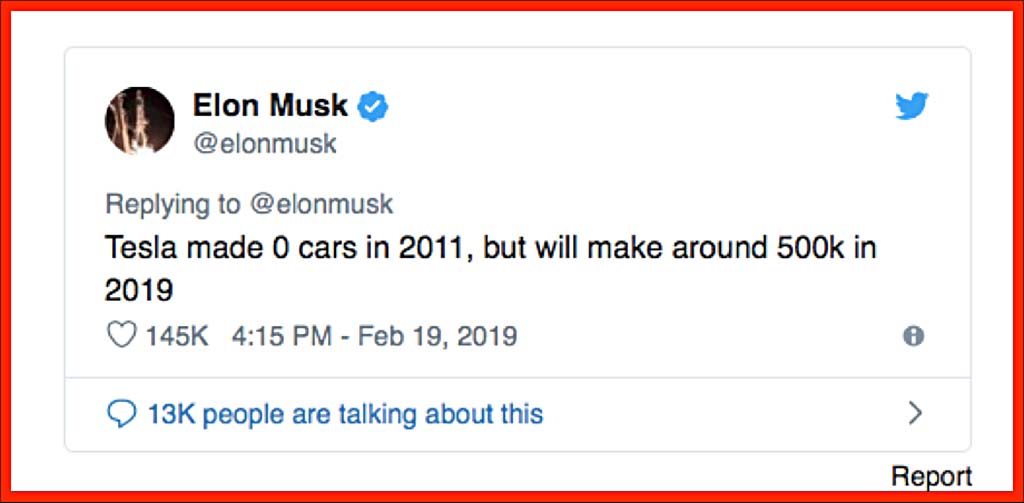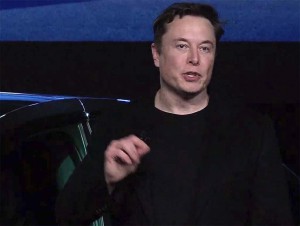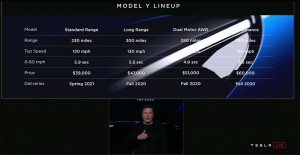Federal regulators have shot back at Tesla CEO Elon Musk in their battle over a contempt-of-court lawsuit, claiming the 47-year-old executive’s legal argument “borders on the ridiculous.”
The case stems from a tweet Musk filed last month declaring that Tesla would produce 500,000 vehicles this year. The Securities and Exchange Commission considered that “material” guidance which, under terms of a separate case last year, required the CEO to first get the approval of the company. But, the SEC said in a new filing, Musk has not cleared a single tweet with Tesla as he had agreed to.
The lawsuit is being heard by U.S. Judge Alison Nathan who could hold Musk in contempt and levy fine or other forms of punishment. The Tesla executive was already forced to relinquish his post as chairman and could now be removed as the automaker’s chief executive officer.
(SEC sues VW and former CEO, alleging “massive fraud.” Click Here for the story.)
The latest run-in between the SEC and Musk stems from a case the agency brought against Tesla and its CEO last summer resulting from the South African-born executive’s claim that he was going to take the automaker private at $420 a share, relying on funding from a Saudi Arabian sovereign investment fund. That initially sent Tesla shares soaring, though they tanked after it became clear that no real deal with the fund was in place.
 Tesla and Musk subsequently paid $20 million each in fines and Musk was removed as chairman. A frequent user of social media, he also agreed that anything potentially relevant to Tesla’s business and its stock price would first be cleared with the company’s “disclosure counsel.”
Tesla and Musk subsequently paid $20 million each in fines and Musk was removed as chairman. A frequent user of social media, he also agreed that anything potentially relevant to Tesla’s business and its stock price would first be cleared with the company’s “disclosure counsel.”
The SEC claims that wasn’t the case with the February 19 tweet which said, “Tesla made 0 cars in 2011, but will make around 500k in 2019.” It says the tweet was in contempt of last year’s settlement.
(Click Here to check out the new Tesla Model Y.)
For their part, Musk’s attorneys levelled a two-pronged response to the government’s allegations. For one thing, they argued, the information in the tweet had already been made public.
In fact, it differs from earlier comments made in both a government filing and during a January earnings call with analysts and reporters.
In the regulatory filing, Tesla said, “We are targeting annualized Model 3 output in excess of 500,000 units sometime between Q4 of 2019 and Q2 of 2020.” Musk also told analysts on reporters participating in the earnings call that with a new Shanghai plant coming on line later this year, Tesla could get “very close” to an overall production rate of 10,000 vehicles a week “by the end of the year.” Both statements would suggest that overall production for the year would not approach 500,000, something that could be seen as being updated by Musk’s February 19th tweet.
The CEO’s attorneys also fired back at the SEC last week by declaring the agency is attempting to limit Musk’s rights to free speech.
“As the SEC interprets and seeks to enforce it, the Order’s injunction is a de facto gag on a broad spectrum of statements implicating Tesla,” the lawyers wrote in their court filing, accusing the agency of an “unconstitutional power grab.”
With the permission of the Manhattan-based federal judge, the agency has now responded that Musk agreed to prior approval as part of last year’s settlement, adding that, “As long as a statement submitted for pre-approval is not false or misleading, Tesla would presumably approve its publication without prior restraint on Musk.”
Legal experts say Judge Nathan is not expected to issue a harsh penalty against Musk but could use the latest case – should she agree with the SEC – to strictly hold the executive to the terms of his earlier agreement.
(Tesla reverses position – will keep some stores open. Click Here for the latest.)
But she may also focus on a series of comments Musk has made in recent months. The executive, who also runs the rocket launching company SpaceX, has never been shy when it comes to taking on the SEC, however, an agency he has belittled as the “Shortseller Enrichment Commission,” a reference to the investors who have bet against the company’s success.
During a December interview on the TV newsmagazine “60 Minutes,” Musk declared, “I want to be clear. I do not respect the SEC. I do not respect them.”
That comment might have been ignored but for the fact that Musk also confirmed that his Twitter posts were not being screened by Tesla. Asked if that could cause problems, he added, “Well, I guess we might make some mistakes. Who knows?”
That’s one of the things that the SEC hopes to address with its compliance order. Tesla has already set up a disclosure controls committee that includes three of its board members, Brad Buss, Antonio Gracias and James Murdoch. The policy is supposed to apply to all senior executives under last year’s settlement.



Elon should line up financing to go private and tell the SEC to F– off.
Almost everything Elon says borders on the ridiculous. As far as free speech goes, I would think that refers to an individuals right to state their own personal thoughts/opinions. I question that is allows one to state what he has personally decided the (publicly held) company is going to do, or what he has decided the opinion of the board of the company is. I would hope that a CEO would be more of a leader and team player, encouraging the rest of the people who run the company to participate. “We” and “I” do not necessarily communicate the same impression.